Episode
2
The
New Horizon
Written &
directed by
ADRIAN REDMOND
Production number 601-101B
Filmed in Alaska 1998-2000
Post production in Denmark 2001
Duration 69 minutes (English version)
Stereo PAL and NTSC
Non-broadcast release on VHS and DVD
Also available in
Danish and Greenlandic |
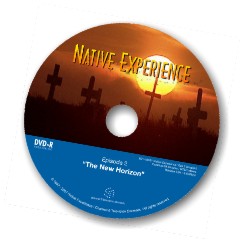 |
|
| |
| The
fate of a single village |
| |
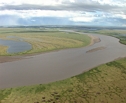 |
Since
time immemorial, the Kuukpikmiut Eskimos have
inhabited the lands of Colville Delta.
In the first half of the 20th century, the advent of
missionaries and schools on Alaska’s North Slope
forced the Kuukpikmiut to settle in towns, although
they continued to hunt and fish on the Delta. |
|
|
| With
the discovery of oil in Prudhoe Bay in 1967, and
the subsequent passing of the Alaska Native Claims
Settlement Act, the Kuukpikmiut stood to lose
their traditional hunting grounds on the Colville
Delta forever. ANCSA stipulated that the village
communities could only own land adjacent to
permanent settlements - and as nomadic hunters the
Kuukpikmiut had no permanent community on which to
base a lands claim - they needed a village. |
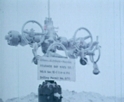 |
|
| |
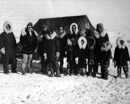 |
Against
fierce opposition from the State Government and
the major oil companies, the Kuukpikmiut staked
their claim to their lands - and in April 1973, 27
families made their journey back to the Colville
Delta, to establish a permanent settlement in
their ancestral homeland.
This would be the first of several winters faced
by a community living in a tent village. |
|
| |
| They
called their new home Nuiqsut - which in Inupiaq
means “A beautiful place over the horizon”.
Whilst the industrial and economic development of
the 70’s and 80’s impacted most of Native
Alaska, the people of Nuiqsut maintained their
traditional way of life, a life founded on
subsistence hunting and gathering and the communal
sharing of their harvest. Though poor in economic
terms, they now owned 155,200 acres of the richest
hunting lands on the North Slope. |
 |
|
| |
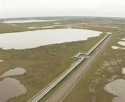 |
But
the oil development which fuelled the economic
growth of Alaska did not stop at Prudhoe Bay - by
the 80’s new oil wells were drilled on the
Kuparuk River, to the east of the village, closing
thousands of acres of hunting grounds to the
villagers of Nuiqsut. |
|
| |
In
1993, as Nuiqsut struggled to come to terms with
the encroaching oil development and the growth of
a cash economy, ARCO Alaska announced the
discovery of the Alpine - an oil field with a
potential yield of 80,000 barrels of oil a day -
on Kuukpikmiut lands only 8 miles from the village
of Nuiqsut.
They had moved here to maintain a traditional
lifestyle - suddenly, the industrial world was
outside their door. |
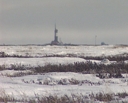 |
|
| |
| This
is the story of a small Native community and its fight to
maintain its culture, language and traditions, and to
influence the course of a development driven by the most
powerful industry in the United States. |
| |
|
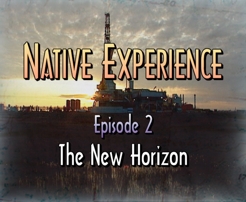
|
| |
| "The
New Horizon" was filmed in and around the Native
village of Nuiqsut, Alaska in the spring and summer of
1999. |
| |
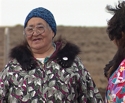 |
Nuiqsut
is a small community with approximately 400
inhabitants, most of whom participated in some way
in the making of this film. Unlike urban
communities, a Native village is characterized by
the high proportion of its citizens who have lived
there for many years - and despite the relatively
recent founding of a permanent village here in the
Colville Delta, this is true of Nuiqsut - many of
the citizens were part of the resettlement in
1973, and many of those who have been born since,
have lived here all their lives. |
|
| |
The
experience of this single community - Nuiqsut - is
interesting because it offers the film maker a
valuable contrast between the broad view of
Alaska's modern history and the close-up view of
the individuals who experienced this
development.
The villagers of Nuiqsut speak from first hand
experience. |
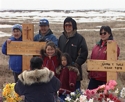 |
|
| |
| The
following contributed to this film with their interviews - |
| |
Lanston
Chinn
Leonard Lampe Jr.
Joe Nukapigak
Isaac Nukapigak
Eli Nukapigak
Bernice Kagliak
Mae Masuleak
James Taallak
Rosemary Ahtuangaruak
Skeet Smith
Pearletta Kittick
Thomas Napageak Jr.
George Woods
|
| |
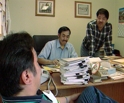 |
The
village corporation of Nuiqsut - Kuukpik
Corporation - was instrumental in the making of
this film - their staff and leaders provided
logistic support and a vital connection between
the producers and the community, establishing the
trust necessary to accomplish this project. |
|
| |
| It
is impossible to discuss the impact of development
on Native cultures without addressing the enormous
social problems which are endemic to Arctic
communities - alcohol and substance abuse,
suicide, domestic violence and child abuse.
For a film maker from the outside such subjects
are approached with trepidation - a fear of
alienating the subjects of his or her film, and
the fear of portraying a single community, family
or individual out of context. |
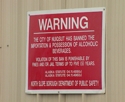 |
|
| |
All
too often, the media focuses on the social downside of
Native life, and strengthens the cliché views about
Natives held by outsiders. In a small community, in which
everyone knows everyone else, it is difficult to speak of
such things - especially to outsiders.
Yet the social problems of the Arctic are very real.
development and change, brought about on a scale and at a
tempo over which the local population has little if any
control, result in wounds to the social fabric of the
community which may take generations to heal.
The experience of Nuiqsut - especially with regard to
suicide amongst its young people - is testament to this
problem, and despite the concerted efforts of the
community, such problems remain perhaps the most tragic
consequence of the changes which the community has faced
and will continue to face in the future. Nuiqsut shares
this dubious fate with hundreds of small communities,
throughout the Inuit world. Our story attempts to address
these issues with respect for those involved. |
| |
It
is interesting that Rig 19 - the drilling rig
which handled the drilling of the Alpine wells -
is owned and operated by another Native
corporation subsidiary - Doyon Drilling Inc.
We had previously filmed onboard Rig 19 for
Episode 4 in 1998, whilst Rig 19 was handling a
series of well work-overs in the Kuparuk field. |
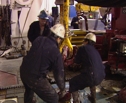 |
|
| |
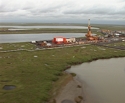 |
Since
this episode was filmed in 1999 further major oil
discoveries have been made on the tundra around
Nuiqsut, and the oil industry continues to search
for, and develop these resources.
The concerns and hopes of Nuiqsut's residents,
which are voiced in our film, are proving very
real. |
|
| |
Construction
work at Alpine is now all but completed, and the
oil field is now in production. Nuiqsut is
experiencing the impact of economic growth and the
community continues to work to harness this
development.
It is our hope to return to Nuiqsut one day and
make another episode to document the effect of
Alpine on this community. |
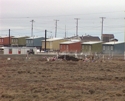 |
|
| |
| This
film makes a valuable contribution towards documenting the
history of the Alaska Native Claims Settlement Act and is
recommended viewing for Native and non-native audiences
alike. |
| |
|

|
| |
|
This
film is dedicated to the Kuukpikmiut
of Alaska
and their descendants who founded Nuiqsut |
|
|